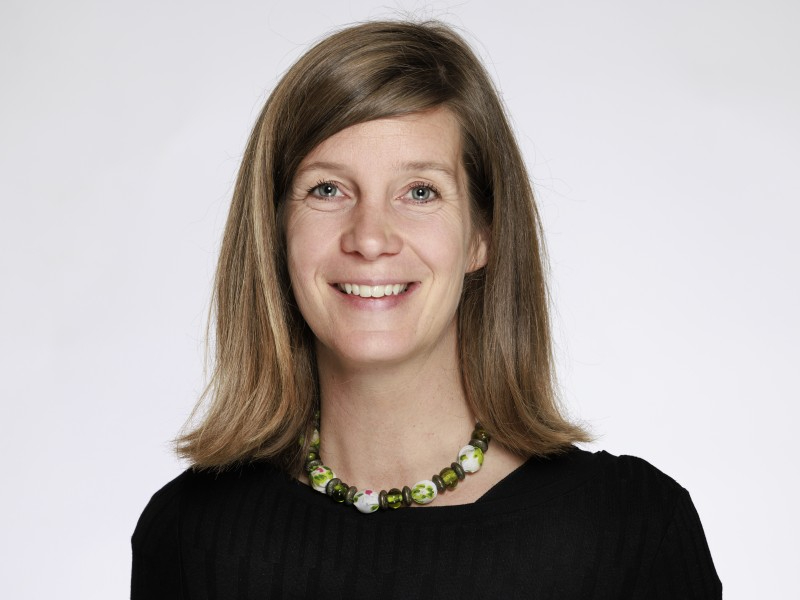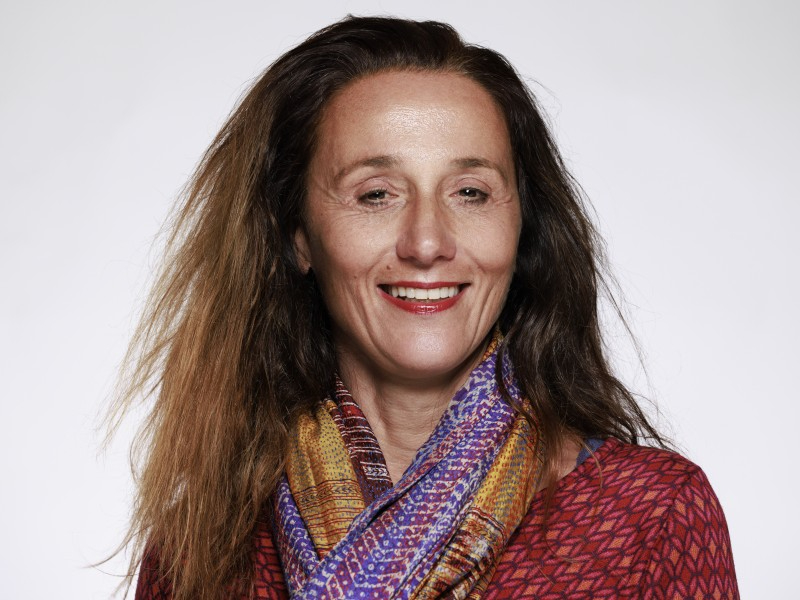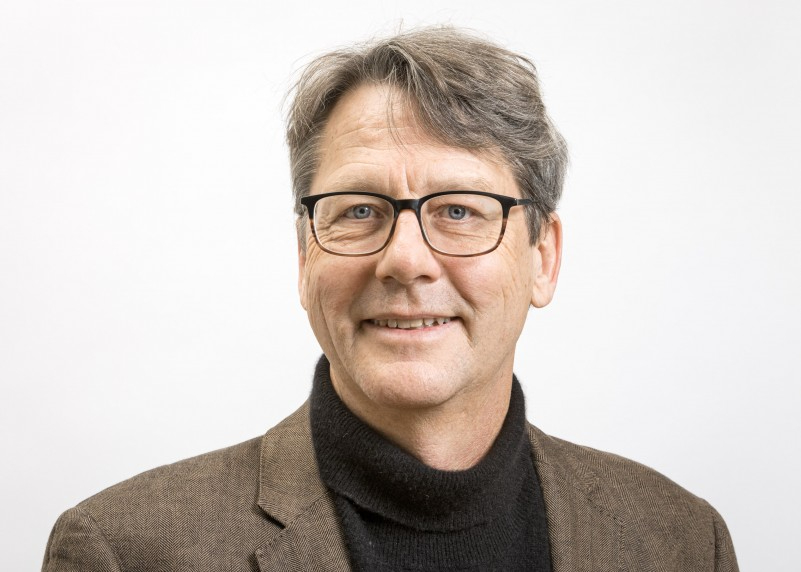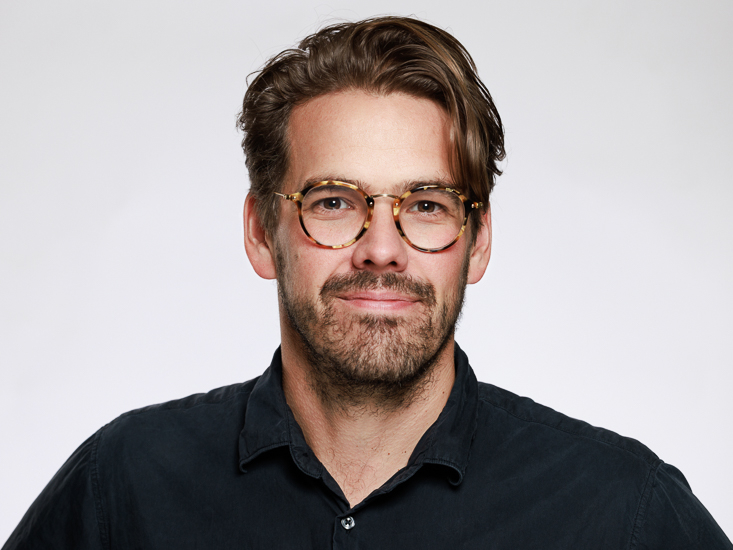Share post now
Article
« How can property own property? »
22.06.2021, International cooperation
Between 2016 and 2019, I had the opportunity to take part in the WOLTS project, an action-oriented research project on mining, pastoralism, and women’s land rights in two Maasai villages in the Arusha and Manyara regions of northern Tanzania.
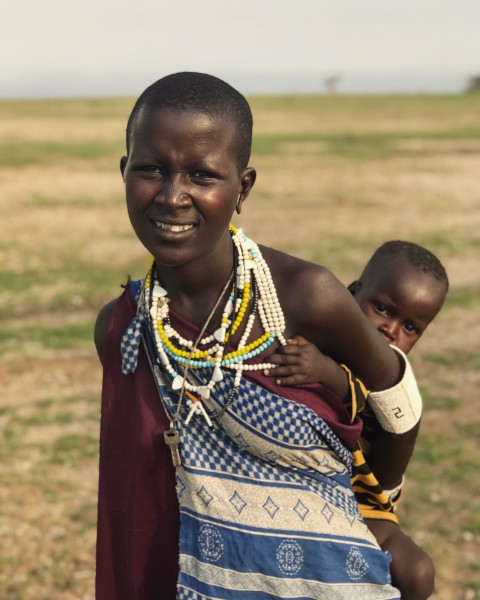
Mundarara, a little village with less than 5000 inhabitants, is nestled in green hills, accessible only by a long, bumpy dirt road, passing giraffes, antelopes and ostriches, Maasai men in flowing red robes, in one hand a stick to herd the cows, in the other a cell phone. We also see ornately-dressed women balancing firewood on their heads while other women are digging through rubble on the tailings of a ruby mine, looking for small gemstones to sell.
On my first visit to Mundarara, our team is met by the village leader, a tall, portly middle-aged man. In his office, a small mud house with a few broken chairs, a table and some yellowed papers on the wall, he greets us with a handshake and a twinkle in his eye. After explaining our mission, we ask him and the other village elders present a few initial questions about mining and land rights in the village. When I ask if women are allowed to own land, one of them responds indignantly, "How can a property own a property?"
This sentence was commonly heard during our research and succinctly summarizes the situation of many Maasai women: women and girls are considered the property of men - first of their father, and then, after marriage, their husband. Women’s ownership of anything (cattle, houses or land) is out of the question.
The Maasai are considered one of the most patriarchal tribes in Africa . Both female genital mutilation and child marriage are still widespread practices, despite legal prohibitions. The stories of many of the women we talk to are similar: hardly any of them have finished elementary school, their working days are long and filled with hard work (fetching water and firewood, milking cows, etc.). The money they earn by selling jewellery, firewood or, more recently, waste products from the mines is often barely enough to survive, especially since many men do not adequately provide for their families.
Hard work starts with marriage
One group discussion I took part in with a group of second wives was particularly memorable. I expected a group of older women, but instead we were greeted by 3 girls, between 14 and 16 years old, two of them heavily pregnant. The girls tell us that they are happy to be second wives because:
"…We feel sorry for those women who don’t have co-wives because they have even more work to do…Heavy responsibility starts with marriage. When you are at home you can tell your mother you are tired and she will tell you to go and rest. When you are married all the power is with your husband and you dare not even tell him that you are tired, otherwise you will be beaten…” (cited in Daley, E., et al (2018). Gender, Land and Mining in Pastoralist Tanzania, p.43).
Violence is also part of many women's daily lives. In many ways, mining has exacerbated this violence, as outsiders now come to the villages to search for gems. In both villages we heard again and again of rapes and even murders that go unpunished. Many women feel abandoned by their husbands and not infrequently women themselves are blamed for having been raped.
Gender roles are changing
As bad as these stories are, we also hear positive stories, stories of change. These come to the fore, especially later in our work. Based on community feedback on our initial research, we offered a structured training programme over the following year. The individual training sessions consisted of information on land rights, mining legislation and gender equality, as well as interactive discussions and role-plays on these topics.
Initially, women sit in one corner, men in the other. Women hardly ever speak, and if they do dare to say something, they are rebuked by the men in the room. Only when we divide the groups by gender do they start talking. I am often asked by the men about my situation. Do I make all the decisions in my house? These discussions are interesting, because not everything is perfect in Switzerland either: I tell them how women were not allowed to vote until 50 years ago, how they needed permission from their husbands to work and how it is still difficult today to reconcile work and family. Sexism and violence are furthermore still part of everyday life for many women here.
In the discussions, we realize that gender roles are changing among the Maasai. While many older people got married through so-called “bookings” (a man gives a pregnant woman a ring, thus booking the unborn child - if it is a girl – for marriage), many younger Maasai talk about an increase in "love marriages". These marriages often remain monogamous and are characterized by much greater cooperation between the couples. The division of labour is also changing due to mining, climate change, and other factors - women are increasingly performing "traditionally" male tasks, like herding cows, but without relinquishing the "traditionally" female tasks, like fetching water and firewood. Here, too, there are parallels with Switzerland, where women are increasingly entering "traditional" male domains both in the professional as well as in the political field, but still often earn much less than men and continue to perform a large part of unpaid care work.
Even the village leaders want to participate
In the training sessions, we discuss concrete examples to show up the difference between "sex" - the male or female body we are born in and "gender" - the roles and tasks a woman or man should perform or the specific attributes considered feminine or masculine. While our body is given to us by birth, gender roles vary from culture to culture and they also change over time. The point of the WOLTS training programme is not to change Maasai culture, or to impose our Western culture, but to show that gender roles and relations are changing – among the Maasai, as well as in the West - and that it is up to all of us to shape and contribute to that change. As one male participant aptly noted, "We can still be Maasai and carry on our traditions, but some traditions are harmful, we have to change them" (quoted from unpublished WOLTS team data).
The findings of the project are now emerging and it is clear that it has had an impact. It certainly provoked discussion and many women felt empowered just by knowing that they have rights and that gender roles are not natural but can change. Even the village leader, who at the beginning had asked: "How can a property own a property", asked if he could be part of the next round of training.
For more information
The Women’s Land Tenure Security Project (WOLTS) started in Tanzania and in Mongolia. For more information see: Mokoro . The full Tanzania research paper (Daley, E. et al (2018). Gender, Land and Mining in Pastoralist Tanzania) can be found here. This article is based on my personal impressions and experience, but draws heavily on WOLTS research findings and all quotes are cited with permission of the project.
Article, Global
«We still have a far way to go»
24.06.2021, International cooperation
Mark Herkenrath is an adjunct Professor of Sociology at the University of Zurich and has conducted research, among other things, on the development implications of economic globalisation and on civil society opposition in Latin America and the USA to the Free Trade Area of the Americas (FTAA). Prior to taking over the directorship of Alliance Sud in 2015, he had already been a member of its team since 2008, with responsibility for the area of international finance and tax policy.
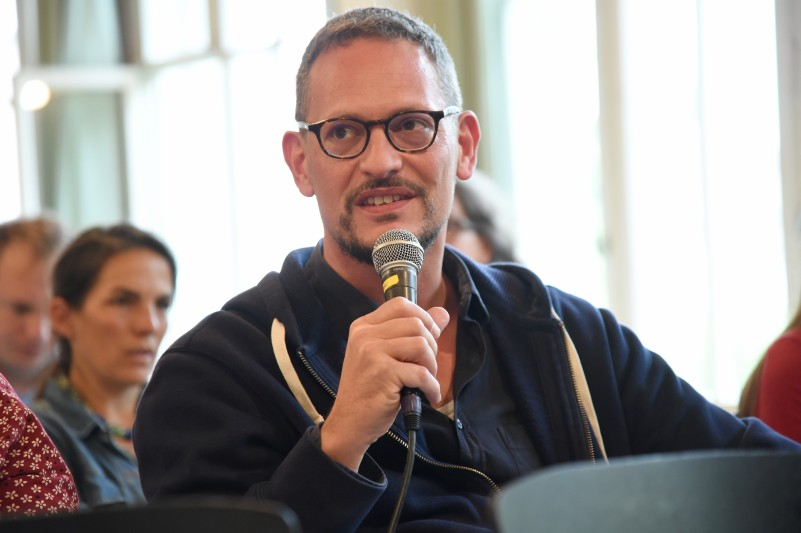
Mark Herkenrath an einer Veranstaltung der zivilgesellschaftlichen Plattform Agenda 2030
© Martin Bichsel
The 2030 Agenda for Sustainable Development was adopted in 2015 and was hailed internationally at the time as a major milestone. So far, however, the Federal Council has hardly implemented anything and the general public knows very little about the Sustainable Development Goals (SDGs). Why is this so?
The Federal Council’s support of the 2030 Agenda is woefully insufficient. It is reluctant to approve new funds for implementing the Agenda and merely wants to incorporate global sustainable development into already existing policy. It is also doing too little to familiarise the general public with the 2030 Agenda. That task falls to the non-governmental organisations even though, at the behest of Foreign Minister Ignazio Cassis, they are now no longer allowed to use federal funds for educational and awareness-raising work in Switzerland.
Yet Federal Councillor Cassis has taken up the cause of sustainability in the new foreign policy strategy…
In 2018, one year after assuming office, Federal Councillor Cassis distanced himself from the 2030 Agenda! In an interview with the “Basler Zeitung”, he vented his annoyance at never having been consulted about the 2030 Agenda in his previous role as a Member of Parliament. As with the UN Global Compact for Safe, Orderly and Regular Migration, he also poured scorn on the Agenda as a concoction of diplomacy that was at odds with domestic policy decisions. In the meantime, however, he seems to have better grasped the fact that an equitable and sustainable world is also in Switzerland’s interests.
The Responsible Business Initiative represented a respectable achievement by Swiss civil society at the polls. In the wake of the referendum, conservative politicians are now keen to limit the leeway available to NGOs (see global #81). Have NGOs become too powerful?
(Chuckles.) That sounds as though NGOs had marched with whole hosts of people to the polls on the Sunday of the referendum to cast their votes. The fact is that in Swiss democracy it is still the voters who ultimately decide. And they certainly make up their own minds. In the referendum on the Responsible Business Initiative, 50.7 per cent of voters came out in favour of an open-minded Switzerland that displays solidarity. The public has legitimate faith in the very well documented cases researched by NGOs; in contrast, their trust in the private sector’s business associations is wavering. No-one still believes the assertion that the interests of the business sector are also invariably good for Switzerland. Naturally, this poses a problem for conservative political circles.
In international cooperation, Switzerland is relying ever more on partnerships with the private sector. Alliance Sud has repeatedly cautioned about the risks entailed, but are there also opportunities?
Of course there are also opportunities, such as new jobs, investments and environment-friendly technologies. But that should not mislead us into ignoring the risks. In developing countries, foreign corporations often displace local companies from the market only to then shift their profits untaxed to low-tax jurisdictions like Switzerland. Moreover, there are human rights violations and environmental problems. This is why partnerships with the private sector in international cooperation should conform to selection criteria and specifications at least as stringent as those applied to partnerships with NGOs. The SDC and SECO are still a long way from this.
The climate movement and the pandemic are prompting ever more scholars to speak out in an endeavour to influence policymakers – is this a positive development?
Yes, this is a good development. In a functioning democracy, the population and their political representatives are expected to make well-informed decisions. This calls for expertise. Besides the expertise of academia, this also means the specialised know-how of NGOs and the ethical expertise of churches. When I still worked full-time in academia, commenting on current political affairs was roundly frowned upon in those circles; op-ed articles in the “NZZ” or in “le Temps” elicited raised eyebrows. Fortunately, things have improved in that regard.
Alliance Sud marks its 50th anniversary this year. What direction is development policy now taking and will it still be needed in 50 years’ time?
Development policy will always be with us: it is in fact global domestic policy. The 2030 Agenda underscores that the making of every policy decision must include gauging the way it will impact the entire world population as well as the future of the planet. We still have a far way to go, however, until the precept of global sustainable development is put into practice. Once again the powerful countries of the North are displaying a strong tendency to prioritise short-term national self-interest over the well-being of nature and humanity. International cooperation too is again increasingly being used to further economic and migration-related interests. This is why, even in the future, there will be the need for an Alliance Sud that pursues policy for the sake of an equitable world.
Share post now

global
The Alliance Sud magazine analyses and comments on Switzerland's foreign and development policies. "global" is published four times a year (in german and french) and can be subscribed to free of charge.
Article, Global
Caucasus: the way out of chaos
06.12.2021, International cooperation
Switzerland’s new cooperation strategy in South Caucasus – Georgia, Armenia and Azerbaijan – focuses on developing depopulated regions and integrating ethnic minorities and migrants.
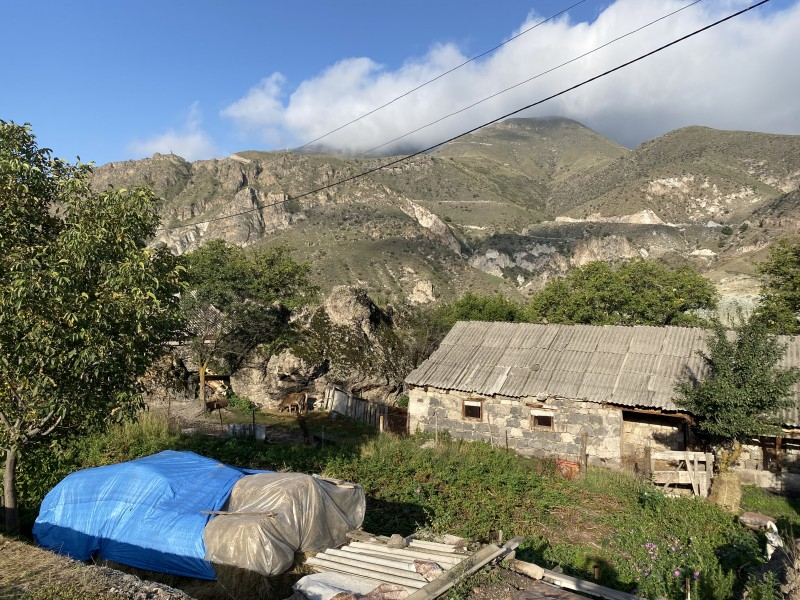
© Isolda Agazzi
It is still dark at six in the morning as Aleksander, a cigarette in the corner of his mouth, set off from home at a brisk pace to milk his cows. "This is really women's work, but I'm doing it today", says Aleksander, who studied mathematics at Tbilisi University then returned to his native village in South Georgia to care for his elderly mother. Together with his wife, who is just preparing breakfast, he has installed a couple of guest rooms to supplement his modest farmer’s income. Is the milking done by machine? "No it is done by hand", he replies in broken English, which he is learning from his daughter who attends primary school in the village. The abundance of fruit, vegetables and flowers growing in his garden can be found all over Georgia. In summer, they submerge this village, at an altitude of 1,300 metres, in a veritable sea of colour. But winters are tough: the house is heated with a wood stove, as the gas supply, recognisable elsewhere from the pipelines that can be seen all over the country, does not reach this remote region close to the border with Turkey and Armenia.
Low-yield farming
"Switzerland has a strong presence in Georgia, where it supports agriculture and livestock farming", says Danielle Meuwly, head of Swiss development cooperation in South Caucasus, as she receives us in her Tbilisi office. There is an enormous urban-rural divide: 40 per cent of the people work in agriculture, which nonetheless produces very low yields and makes up just eight per cent of GDP."
There is great inequality in the country: in 2021, the Gini coefficient[i] was 36.4, which places it 89th in the US World Population Review country rankings.
To promote agricultural expertise, Switzerland has mounted a vocational training project in conjunction with the Plantahof Institute. A programme has been launched jointly with the NGO Swisscontact to support small and medium-sized enterprises (SMEs) in rural areas, and is expected to help boost farmers' incomes. Switzerland is also committed to preserving forests within the meaning of the new Forestry Law, which tightly regulates logging. The law still lacks popular acceptance, however, and for the most part, people like Aleksander need to be offered an alternative to wood-fired cooking and heating.
Switzerland as representative of Russian interests in Georgia and vice versa
This remit is part of the new 2022-2025 Swiss Cooperation Strategy in South Caucasus, to be published in early December. "It is a regional strategy that also encompasses Armenia and Azerbaijan and is being implemented jointly by the SDC, Seco and the Peace and Human Rights Division of the Federal Department of Foreign Affairs", Danielle Meuwly continues. "For practical reasons, and because the country receives the biggest budget, we maintain our office in Georgia. The Confederation's involvement in this region is significant – more specifically, its role here is a protective one." In the wake of the war in August 2008 and Russia’s recognition of Abkhazia and South Ossetia, Georgia severed diplomatic ties with Moscow. Since 2009, Switzerland has been representing Russia's interests in Georgia and Georgia's interests in Russia.
In the extremely impoverished Abkhazia region, where international humanitarian aid is needed, projects have been launched, as part of Swiss cooperation, to upgrade sanitary facilities in schools and train women in cheese-making under hygienic conditions.
Integrating ethnic and religious minorities
Beyond diplomatic concerns, we endeavour to build a bridge and foster cooperation between the civil societies on both sides", says Medea Turashvili, who is responsible for human safety matters. "We endeavour to safeguard the rights of religious minorities and ethnic groups." This cannot be taken for granted in a country that has continuously been besieged by Mongols, Turks, Arabs, Persians and Russians. Embodied by the powerful Georgian Orthodox Church, religion has always been a refuge and today remains a key element of the national identity.
Although Orthodox Christians are in the majority, there are also Georgian Muslims, Azeris, Chechens, Armenians and other minorities, who are hardly integrated. "Members of ethnic and religious minorities often do not speak the Georgian language, as the education system is such that they are unable to learn it properly", says Danielle Meuwly. "They have much stronger ties with their communities of origin than with their immediate surroundings. Our goal is to reduce this alienation so that the various communities can live together in peace. In the south of the country where there is a large Azerbaijani community, service centres have been opened to provide information to the population in the Azerbaijani language. We sat down with the political parties ahead of the 2018 and 2020 elections to work out a code of conduct."
Helping migrants to integrate
There are numerous orchards and vineyards in the Kakheti region in the east of the country. The region is famous for its wine. Georgia is reputed to be where winegrowing originated and to this day, families still produce their own wine in their cellars. The image of the villages is nevertheless dominated by countless abandoned houses with their finely-worked wooden balconies falling to pieces. Most of the residents, and especially the young generation, are going abroad. In a country where the average monthly wage is 300-400 euros, they are seeking greener pastures in Western Europe – the men often as construction industry workers and the women as domestic helpers. Georgia has a population of almost four million, of which 1.7 million are migrant workers.
Their money remittances are an indispensable source of income for families back home. In Switzerland, Georgia occupies fifth place among the countries of origin of asylum seekers, as the Schengen Visa requirement was waived for its nationals in 2018. They have no chance of being recognised as refugees, however, and are systematically turned down. There are Swiss cooperation projects being run in Kakheti and other provinces for the reintegration of former migrants and for the revitalisation of communities.
Alliance Sud welcomes the fact that Switzerland supports the social and economic reintegration of returnees, but nonetheless urges the country not to make its aid dependent on the readmission of rejected asylum seekers, as it committed itself to do. Given the labour shortages in so many professional fields, Alliance Sud calls on the Federal Council to adopt a sustainable migration policy that allows migrants to find work in Switzerland, apart from clandestine employment.
[i] This coefficient is used to measure income inequality in a country. The Gini coefficient is a number between 0 and 1 (often also expressed as a percentage), where 0 means absolute inequality.
Independent but closely monitored civil society
Civil society is a key player in Georgia. It is funded mostly by Western donors, including Switzerland, and its relations with the government are marked by highs and lows.
“We can largely carry out our activities without obstructions, but in recent years the ruling party tends to discredit critical CSOs with baseless accusations of lacking the competency or working in line with opposition parties and this tendency seems to become persistent. Such harsh statements and hostile attitudes complicate advocating our recommendations with different branches of government”, says Vakhtang Menabde, Director of the Programme for the Support of Democratic Institutions of the Georgian Young Lawyers Association (Gyla).
Georgia has been ruled since 2012 by the Georgian Dream Party, which succeeded the United National Movement. The latter had severely curtailed the independence of the justice system and civil society freedoms, according to the activist. Some liberalisation processes began in the wake of the 2012 elections. “Sadly, even though several waves of reforms were launched, most of them improved only some flaws in the system and superficially decorated its façade but did not change the real institutional characteristics. Therefore, unfortunately, today independence of the judiciary in Georgia is sternly restrained”, he continues.
As regards the role of civil society, for years now the Gyla NGO has been militating for reforms to the justice system, local government and voting rights. Vakhtang Menabde does indeed welcome the fact that many of his recommendations have found their way into law, but the key proposals that would lead to genuine changes in the power structure have been ignored. “To sum up, civil societies in Georgia operate mostly in a free, but very polarized and tense environment”, Vakhtang Menabde concludes.
That apart, several recent scandals have revealed that civil society activists, journalists and political associations have been under close surveillance by State security services. In an open letter published in August, a dozen NGOs denounced the disproportionate powers of the State Security Service and its attacks on privacy.
Share post now

global
The Alliance Sud magazine analyses and comments on Switzerland's foreign and development policies. "global" is published four times a year (in german and french) and can be subscribed to free of charge.
Article, Global
“Poverty is a political choice”
05.10.2020, International cooperation
The outgoing UN Special Rapporteur on extreme poverty leaves behind an alarming report. It posits that the narrative of declining global poverty is based on questionable figures. And the role of development cooperation is being overrated.
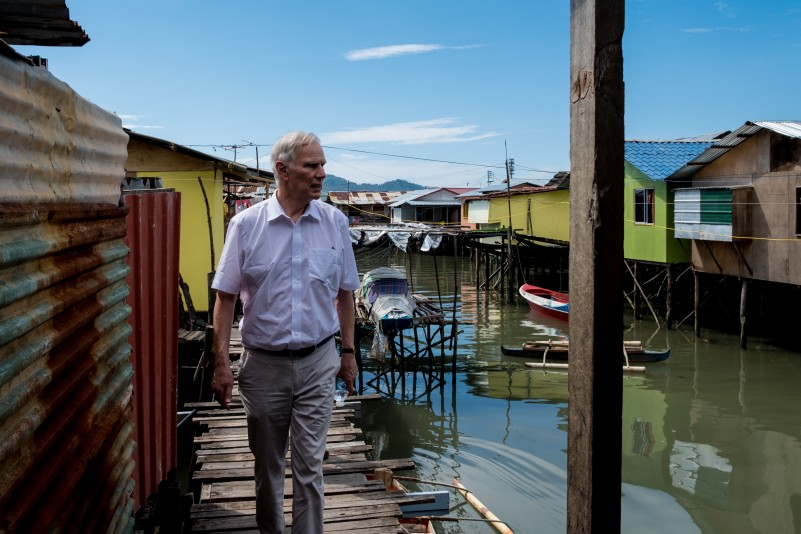
Philip Alston, former UN Special Rapporteur on extreme poverty and human rights during a visit to the village of Kampung Numbak in Sabah province, Malaysia.
© Bassam Khawaja
The final report by UN Special Rapporteur on extreme poverty and human rights, the Australian Philip Alston (70), Professor of International Law and Human Rights at the New York University School of Law, opens an urgently needed debate. We are repeatedly told by governments, the media and development organisations that recent decades have seen a massive decline in global poverty, thanks not least of all to the generous aid of the wealthier countries.
The narrative regarding a substantial decline in poverty is generally based on World Bank parameters, which set the extreme poverty threshold at 1.90 US dollars per day. This arbitrary figure is derived from the average of the national poverty thresholds established for 15 of the world’s poorest countries. On this basis, the number of people living in extreme poverty is thought to have declined from 1.895 billion in the year 1990 to 736 million in 2015, or from 36 to 10 per cent of the world’s population. What is often left unsaid is that this by no means indicates a global trend — in sub-Saharan Africa and the Middle East, the number of people living in poverty even increased by as many as 140 million during this period. What is better known is that poverty reduction occurred predominantly in China where, by World Bank measurements, the number of people living in extreme poverty dropped from 750 million to 10 million over the period concerned.
A closer look at the statistics behind these estimates is warranted. The aforementioned poverty yardstick makes no allowance for the differing basic needs of individual countries or regions, but is treated as an absolute and constant value – adjusted only for purchasing power parity.[1] Hence, the purchasing power-adjusted poverty threshold in Portugal, for example, is 1.41 euros, which of course is hardly enough for mere survival. But in most developing countries as well, national poverty thresholds are set well above the World Bank’s 1.90 US dollars, with the result that national statistics show poverty rates much higher than those based on World Bank calculations. Two examples are Thailand and South Africa: the former has no extreme poverty by World Bank standards, whereas the national statistics show 9 per cent; for the latter, the difference is 18.9 per cent versus 55 per cent.
If we take a more realistic but no less arbitrary poverty threshold of 5.50 US dollars per day, global statistics look less rosy. The number of people affected by poverty will have fallen from 3.5 to 3.4 billion between 1990 and 2015 (or from 67 per cent to 46 per cent of a world population that grew strongly over that period). This reckoning too overlooks the fact that many people affected by poverty such as the homeless, migrant workers, refugees or domestic workers are not even included in poverty statistics, which are derived essentially from household surveys. Nor do the statistics reflect gender-specific poverty differences.
Climate change, the corona crisis and the accompanying sharp economic downturn in many countries are compounding extreme poverty even further. The World Bank anticipates that climate change will plunge an additional 100 million people into extreme poverty (measured by 1.90 US dollars per day) and that the corona crisis will cause as many as 60 million people to fall back into extreme poverty. With more realistic yardsticks these figures would be considerably more depressing.
Has development cooperation failed?
One could conclude that development cooperation has failed if there is a persistently high level of extreme poverty. This argument, however, credits development cooperation with power and influence that it simply does not have. The Alston report shows that for the year 2019, OECD countries disbursed 152.8 billion US dollars in the form of grants or favourable loans to developing countries. At the same time, the poorest countries as well as middle income ones made annual debt repayments of 969 billion US dollars. Some 22 per cent of that amount, or 213 billion, represented interest alone, which therefore produced no development benefits at all. Perhaps even more dramatic are the billions that developing countries lose each year as a result of profit shifting by multinational corporations[2] and illicit financial flows, or losses that they suffer as a result of unequal trade relations.
Development cooperation has demonstrably helped many people escape dire poverty and considerably improved living conditions for the most needy. Much has been achieved over recent decades, especially in education, healthcare and the reduction of maternal mortality. But all this means very little if at the same time, rising numbers of people are losing their livelihoods to make way for commercial agriculture, the extraction of raw materials or the building of gigantic infrastructure projects most often one-sidedly oriented towards export promotion. Countries are still being compelled through World Bank and International Monetary Fund (IMF) loans, or more precisely the attached conditionalities, to cut back social spending, deregulate their trade and guarantee fiscal privileges for foreign investors. Even in today’s post-colonial era, most developing countries continue to be commodity suppliers to the rest of the world, finding themselves trapped in a web of debt, unequal trading relations, tax flight and corruption. In these circumstances, the relatively modest resources of development cooperation remain woefully inadequate.
UN Special Rapporteur Alstom puts it succinctly: “Poverty is a political choice”. People remain in poverty as long as others continue to profit from it. Companies domiciled in the rich countries are still allowed to generate massive profits on the backs of the poorest, and we consumers are expected to buy goods produced cheaply elsewhere (such as food, clothes, or electrical appliances).
Focussing on inequality
Alston logically advocates placing not just poverty but also inequality at the centre of the debate. Alston is by no means the only one making this call. In a recently published paper, German World Bank Executive Director Jürgen Zlatter urged the Bank to focus more strongly on inequality within and between countries. He cites the economist Thomas Piketty, for example, to illustrate the appreciable worsening of inequality over the same period in which the World Bank measured a massive decline in poverty. Hence, between 1980 and 2014, the post-tax incomes of the bottom 50 per cent of the world’s population grew by 21 per cent, while those of the upper 10 per cent rose by 113 per cent. Over the same period, the incomes of the top 0.1 per cent of the world’s population skyrocketed by as much as 617 per cent! The upshot is that today, the world’s richest 1% have more than twice as much wealth as the poorest 6.9 billion people.
Zlatter highlights how the policies pursued in many countries during the 1980s and 1990s weakened trade unions, curtailed social benefits and reduced the progressivity of income taxes. The ever greater liberalisation of trade and the emergence of global value chains are believed to have significantly boosted the market power of individual companies and sparked a global race to the bottom with respect to wages. At the same time, the liberalisation of the financial sector did much to exacerbate inequality, writes Zlatter. Although the author stops short of any direct criticism of the World Bank, these are the very liberalisation and deregulation measures still being imposed on developing countries by the World Bank and IMF.
World Bank economist Zlatter and UN Special Rapporteur Alston both agree that inequality and social redistribution must be placed at the centre of the debate – not only within the World Bank, but also in the broader debate on poverty. For them, the main starting point is a strong focus on tax justice. The alternative looks gloomy: not only will the accelerating climate change and the disastrous economic impacts of the corona crisis plunge huge numbers of people into poverty, but we must also expect mounting social unrest, conflicts and protest movements.
[1] Purchasing power parity is calculated starting with what 1.90 US dollars can buy in the USA and determining how much money is needed in other countries to purchase the same things.
[2] According to a Research project in which the economist Gabriel Zucman was a key participant, in 2017 multinational enterprises shifted 741 billion dollars to tax havens, of which 98 billion flowed into Switzerland. Unfortunately, we have only insufficient data on most of the profit shifting from developing countries – the data available, however, are disturbing. Nigeria, for example, loses about 18% in profit and tax revenue each year, South Africa 8% and Brazil 12%.
Share post now

global
The Alliance Sud magazine analyses and comments on Switzerland's foreign and development policies. "global" is published four times a year (in german and french) and can be subscribed to free of charge.
Article, Global
Global solidarity in crisis
07.12.2021, International cooperation
Despite vaccines and economic recovery in Switzerland: globally, the corona crisis is far from over and inequality is on the rise. An interim assessment and a plea for more global responsibility.
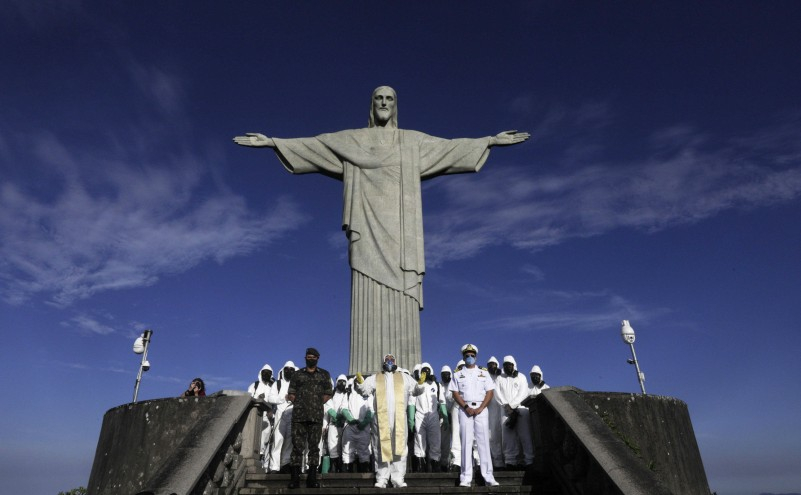
A Catholic priest with soldiers disinfecting the statue of Christ in Rio de Janeiro, Brazil.
© Ricardo Moraes / REUTERS
In December 2019, Chinese media reported the spread of an unknown virus in Wuhan, at the end of January 2020, the World Health Organisation (WHO) declared a global health emergency. The virus has meanwhile spread rapidly around the world and brought the international economy and the social lives of many people to a standstill virtually overnight. Since then, many things have no longer been the same. More than five million people around the world have died from the virus (the estimated number of unreported deaths is much higher), while countless others continue to suffer the health-related, social and economic consequences of the pandemic. Although the development and approval of several Covid vaccines offered a glimmer of hope on the horizon, the pandemic is far from over in many places and several of its economic and social impacts are only now becoming really apparent.
In April 2020 Alliance Sud published an article entitled "A global crisis needs global solidarity", highlighting the fact that the crisis affects everyone, but not equally. Alliance Sud argued for more support for the poorest countries in overcoming the crisis, for global debt forgiveness and for reconstruction guided by the "build back better" principle. But what has happened in the meantime and where do we now stand after almost two years of Corona crisis?
Do we really have the pandemic under control?
Western health systems have also repeatedly come close to breaking point over the last two years. Crisis-weary health personnel, overcrowded intensive care units and many tragic personal stories have dominated the headlines. But the most serious catastrophes were being played out elsewhere – in India, Brazil or Peru, where the spring of 2021 witnessed countless families driving around cities for hours in search of oxygen while their loved ones slowly suffocated in hospital or on the way there; or in the refugee camps of Bangladesh, Colombia or Turkey, which saw not only the rapid spread of the virus but also appreciable spikes in food shortages and hunger.
Millions of people lost their jobs during the covid pandemic. This has led the International Labour Organisation (ILO) to estimate the 2022 unemployment figure at 205 million, compared to 187 million in 2019. Unemployment has skyrocketed over the past year, especially among young people and women. The number of working poor – workers who live on less than 3.20 dollars a day – has also risen by 108 million since 2019. The situation is most disastrous, however, for the more than two billion informal sector workers who have no social security at all. For them, lockdowns and other restrictions have meant losing their livelihoods in many instances.
The World Bank too finds that extreme poverty has again risen for the first time in 22 years on the back of the Corona crisis. It estimates that to date, some 121 million people have been pushed into extreme poverty as a result of the crisis. But as Alliance Sud has reported in a background article, the World Bank's 1 dollar/day poverty line is set extremely low and has several methodological flaws. A more realistic definition of extreme poverty would perhaps convey an even more dire picture.
Food insecurity and hunger have also been considerably exacerbated by the Corona crisis. In 2020, for example, one in three people lacked access to adequate food. In the space of just one year, the prevalence of malnutrition rose from 8.4 to about 9.9 per cent, having remained virtually unchanged for the five preceding years. Compared to 2019, hunger affected an additional 46 million people in Africa, 57 million in Asia and roughly 14 million in Latin America and the Caribbean in 2020.
Through an extensive survey of 16,000 people in 25 countries, Helvetas and seven other European NGOs have verified the massive decline in income, food security and access to education confronting many people. The study shows that those who are already most vulnerable – the elderly, people with disabilities, single mothers, women and children – are the ones being hit the hardest by the pandemic.
Global economic upheavals
While the economies of many Western countries, including Switzerland, seem to be recovering at a remarkable pace, the recovery in the Global South is proving much slower. The International Monetary Fund (IMF) projects world economic growth of 6 per cent in 2021, but a mere 3.2 per cent for the African economy. Compared to those of the 2008 global financial crisis, the economic repercussions of the Corona crisis have been considerably more devastating for most of the poorer countries – especially those in Africa and South Asia.
The global spike in commodity prices has driven up the cost of many basic products: metal and oil prices have been rising since mid-2020, and annual food price inflation reached almost 40 per cent in May 2021, the highest in a decade. While rising metal and oil prices pose a problem mainly for industrialised countries, rising food prices have significant implications for poverty and hunger in poorer countries. In Nigeria for example, food prices have surged by almost a quarter since the onset of the pandemic, driving 7 million people into extreme poverty.
Tourism has been another sector hit especially hard by the pandemic. International tourist arrivals in the poorest countries plummeted by 67 per cent in 2020. The UN estimates that it will take at least four years for the number of tourist arrivals to return to 2019 levels. This is jeopardising the livelihoods of individuals, households and communities as well as the survival of businesses all across the tourism value chain.
Burgeoning debt
While most developed countries have rolled out massive stimulus packages to attenuate the economic impacts of the Corona crisis, poorer countries lack both the resources and the policy space needed to emulate the West. This is so because a) their creditworthiness renders them unable to borrow on international capital markets at reasonable interest rates; b) they cannot print money owing to spikes in inflation; and c) international tax evasion impedes them from raising sufficient funds in their own countries.
The IMF estimates that low-income countries would have to spend some USD 200 billion over the next five years in the ongoing battle against the pandemic and another USD 250 billion to speed up economic recovery. Yet most of these countries have no room for manoeuvre to increase their spending. According to the IMF, 41 low-income countries even cut back their overall expenditure in 2020. This notwithstanding, 33 of them still saw a rise in their public debt-to-GDP ratio. The external debt of developing countries thus hit a record USD 11.3 trillion in 2020, 4.6 per cent more than in 2019 and 2.5 times the 2009 figure in the wake of the global financial crisis.
Where is the global solidarity?
Despite numerous calls for generous support and debt relief, little has been done to date. The Debt Service Suspension Initiative (DSSI) agreed on by the G20 countries, the World Bank and the IMF in the spring of 2020 led only to the temporary suspension of bilateral debt servicing for some countries. Not only did China, as a major lender, not participate in the initiative, but neither did the numerous private lenders support the DSSI.[1] Moreover, barely more than half of the "eligible" countries participated, for fear of displeasing their private creditors. Ultimately, the DSSI increased the financial leeway for 46 debtor countries in 2020 and 2021 (by USD 5.7 billion and USD 7.3 billion). However, as the suspended debt payments will have to be reintroduced into the repayment schedules as of 2022, the looming debt crisis was at best postponed rather than eliminated. Furthermore, the emergency loans granted by the IMF and the World Bank for dealing with the crisis are hardly the solution to the problem, as they only generate further indebtedness.
Although Official Development Assistance (ODA) increased by 3.5 per cent in 2020, it still represents a mere 0.32 per cent of the combined gross national income (GNI) of OECD-DAC member countries. This is less than half the internationally reaffirmed target of 0.7 per cent of GNI, which is supposed to be allocated to ODA and represents just about 1 per cent of the funds mobilised for domestic stimulus packages. Although Switzerland did quickly release additional funds for humanitarian projects and for the Covax Alliance, even in 2020, as one of the world’s richest countries, it only allocated 0.48 per cent of its GNI to ODA – a far cry from the internationally agreed target of 0.7 per cent.
Global vaccination apartheid
Former OECD Secretary-General Angel Gurría too has emphasised that far more will have to be done in the future to help developing countries with vaccine distribution, health care and assistance for the poorest and most vulnerable.
Unfortunately, the selfishness of Western countries is apparent not only in their economic stimulus packages, but also in the distribution of Covid vaccines. While many Western countries are already vaccinating children or administering third, so-called booster shots, in the poorest countries, just 3.1 per cent of the population have received at least one vaccine dose.
A study by the Airfinity research institute shows that at current vaccination rates, 80 per cent of adults in G7 countries will be vaccinated by the end of 2021. At the same time the G7 will have amassed nearly 1 billion surplus vaccine doses. These would be enough to vaccinate a large part of the population in the 30 countries with the lowest vaccination rates (most of them are in Africa). Set up to ensure more equitable worldwide vaccine distribution, the Covax initiative has so far delivered less than 10 per cent of the 2 billion doses promised to low and middle-income countries. Part of the reason for this is that richer countries have signed priority contracts with vaccine manufacturers, thereby squeezing Covax out of the vaccine market. Absurdly, several rich countries (including England, Qatar and Saudi Arabia) have themselves also obtained vaccines under the Covax programme.
With a population of 8.6 million, Switzerland too has so far signed contracts with five vaccine manufacturers for a total of almost 57 million doses (although only three vaccines have been approved by Swissmedic to date). Although Astra Zeneca is not licensed in Switzerland, 4 million doses of that manufacturer's vaccine were promised to Covax, of which only about 400,000 have been distributed up to now.
Alongside the Covax initiative, it is also crucial to build vaccine production capacity in low- and middle-income countries. To that end, however, pharmaceutical companies would need to share their vaccine technology and know-how with manufacturers in these countries. A proposal submitted by India and South Africa at the World Trade Organisation (WTO) seeking a temporary waiver from certain provisions on intellectual property rights for tests, treatments and Covid vaccines has been supported by China, Russia and in part by France, the USA and Spain, as well as by the WHO and Pope Francis. The pharmaceutical industry and Switzerland oppose it and are still arguing for voluntary measures.
Back to normality?
While it may well appear that the Corona crisis will soon be behind us in Switzerland, the world as a whole is still far from that point. It will take more than ad hoc support for humanitarian projects, the donation of "old" or "unwanted" vaccine doses and the granting of more loans to poorer countries to combat the current crisis and its underlying structural causes.
Only when we admit that we are all interconnected and bear a common responsibility to make the world a liveable place and to keep it that way, will we be able to move forward and overcome not just this crisis but also its underlying systemic crises, including the global climate crisis. For the Corona pandemic has made one thing abundantly clear: where there is a (political) will, there is a way.
[1] An Alliance Sud study, based on data from the Swiss National Bank (SNB) and the Bank for International Settlements (BIS), finds that the public debt owed by the 86 poorest countries to 40 Swiss banks amounts to 5.7 billion Swiss francs.
Switzerland's responsibility
As one of the world's richest and most globalised countries, Switzerland has a particular responsibility. Alliance Sud therefore calls on the country:
- as the world's leading low-tax jurisdiction and seventh-largest financial centre, to act without delay to halt tax evasion from poor countries involving Swiss corporations, financial service providers and law firms. Only then will poor countries be able to mobilise sufficient public resources to fight the Covid crisis;
- to make the case for the 40 Swiss banks with currently outstanding loans to the 86 poorest countries to write off all loans to these countries in the light of the social and economic circumstances prevailing in these debtor states;
- to finally honour its international promise and gradually increase its ODA quota to 0.7% of GNI and make the rights, needs and aspirations of the poorest and most vulnerable people the principal focus of its development cooperation programmes.
- and to hand over its surplus vaccine doses to Covax as soon as possible and cease stonewalling the WTO proposal by India and South Africa.
Share post now

global
The Alliance Sud magazine analyses and comments on Switzerland's foreign and development policies. "global" is published four times a year (in german and french) and can be subscribed to free of charge.
Article, Global
Chronicle of a death foretold (or perhaps not)
21.06.2022, International cooperation
Does the brutal military attack on Ukraine signal the beginning of the end of globalization, as is being put about by many sources? An attempt to take stock.
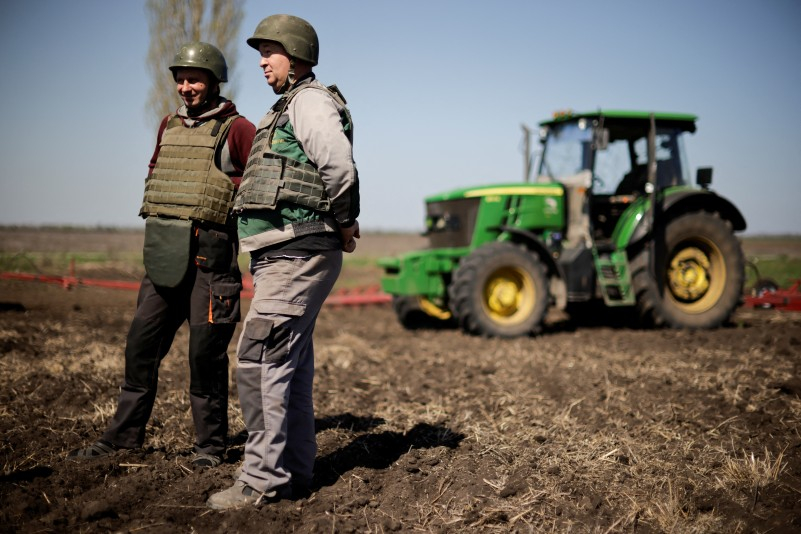
The difficulty of talking about globalization stems from the fact that the concept is used to mean very different things. The German “global historian” Juergen Osterhammel writes: “Everyone talks about ‘globalization’, tacitly assuming that its meaning is clear. An unrealistic assumption.” He therefore suggests that it would be better to speak of “globalizations”. As such, globalization would no longer signify the “single, all-embracing, worldwide process that encompasses all of humanity”, but a number of different processes in the world, whether concurrent or not, which may somehow be interconnected – or perhaps not.
Roughly speaking, there are two perspectives in the discourse on globalization, which are rarely distinguished well enough from each another, and which explain why there is so much talking at cross purposes on this subject. On the one hand, globalization means economic policy prescriptions that are based on an economic theory, or better yet, an ideology. That was how the “critics of globalization” of the noughties understood the concept. This ideology and the (often unpalatable) prescriptions were garnished with tales about the promises of globalization. On the other hand, the “globalization” label is given to real processes, e.g., the growth of international trade, the expansion of cross-border capital flows, or the weight of multinational enterprises – and the list could go on.
This is often premised on the assumption that the ideologically-inspired prescriptions constitute a linear path to the real and measurable processes such as the dismantling of trade barriers and capital controls that brought about the rapid expansion of global trade. It is not that simple, however, as a substantial part of the growth in world trade goes back directly or indirectly to the fact that China has become the “workshop of the world”. But China has been highly selective in its dismantling of trade barriers, it has never liberalized capital flows, and has also retained state control in other sectors.
The truth is that there is a complex mix of ideology, prescriptions, and real developments, which may be summed up as follows. Since the 1970s, the restructuring of global capitalism has been driven by an economic ideology that was eagerly embraced by multinational enterprises and Western governments. The economic policy prescriptions derived from it and applied by governments favoured the rise of global corporations and unleashed four key global processes: the rapid expansion of international trade, the relocation of industrial production to less “developed” countries (including China), the surge in South-North migration (more pronounced in the USA and in Europe, including from east to west) and – most critically – since the 1970s, the exponential growth of the financial sector and its significance for the economy and financial policy within countries and across borders.
The ideology
The economic ideology is commonly referred to as neoliberalism, and with “neoliberalism”, the situation is exactly the same as with “globalization” – two people in a room have three different interpretations of it. But help is at hand from the US historian Quinn Slobodian. In the book titled “Globalists – the End of Empire and the Birth of Neoliberalism” (2018), he distinguishes between two neoliberal concepts, the better-known one being from Chicago, and the other from Geneva. The first stands for more “laissez-faire” and less and less state (national) boundaries, i.e., it favours self-regulating markets, which increasingly replace smaller government in the role of structuring a society. Or, to paraphrase the Swiss FDP of the 1970s: more markets, less State. Neoliberal economists of the Chicago school associated with US economist Milton Friedman dreamt of a single, all-encompassing world market. In their view, politicians should retain a role only where this market fails to function. For Friedman and his followers, this ought never really to be the case, except in matters of security (army and police).
Slobodian establishes a contrast between this notion of neoliberal globalization as a worldwide process in which free market forces by themselves can deploy their full potential, and the Geneva group of neoliberal forward thinkers. This latter group came together in the 1930s at the University of Geneva – precisely where the UN also has its second home. Unlike the Chicago School, these members of the Geneva School, coalescing around the German economists Willhelm Röpke, Ludwig von Mises or Michael Heilperin, did not wish to liberate “the market” from “the State”, but instead to place the State at the service of the market, with the uppermost goal of securing the right to private ownership not only in a particular nation-state, but all around the world. Slobodian writes that what the “Geneva boys” wanted was for the State to provide the market with a global (private) law framework, thereby elevating to a supranational level the mechanisms that serve to encourage more private ownership – without also having to take on board the onerous, restrictive rules of a redistributive welfare state.
The prescriptions
In 1989, the prescriptions inspired by the economic ideology of neoliberals of varying hues was labelled the “Washington Consensus”, because it was embraced by the International Monetary Fund, World Bank, and the US Department of the Treasury, all institutions located in that city. In reality, “Consensus of Washington, Geneva (WTO – trade), Paris, (OECD – fiscal policy) and Brussels (EU)” would have been more appropriate. Emerging initially as a reaction to the Latin American debt crisis, the core of this programme consisted of competition (above all, the dismantling of the welfare state), deregulation (trade and capital flows), and privatization. In the 1980s, and in exchange for new loans, this “consensus” was imposed on debt-ridden Latin American and African countries through so-called structural adjustment programmes – a period that was later to be often called “the lost decade”, as poverty had increased substantially in many countries.
The driving force and the beneficiaries of this agenda were the multinational corporations and, more particularly, the banks and other financial players. In the year 2000, ABB Chief Percy Barnevik summed up the corporation’s programme as follows: “I define globalization as the freedom of our group of companies to invest wherever and whenever it wants, to produce what it wants, to buy and sell wherever it wants, and to keep all restrictions emanating from labour laws or other social regulations as minimal as possible.”
The collapse of the Soviet Union in December 1991 marked a major turning point. The end of the “East Bloc” left just one superpower, and the prescriptions could then be applied across the world. After the Global South, other prominent victims of these prescriptions were the countries of the former Soviet Union. US economic advisers persuaded their governments to apply the Washington Consensus as a shock therapy. The outcome was that domestic industry all but disappeared, and a handful of people were able to help themselves to some of the national wealth and to the commodities that had survived as the dominant sector of the economy. There would have been no oligarchs without the Washington Consensus.
The promises of globalization
The ideologies of globalization and its prescriptions went hand-in-hand with a series of narratives and promises, which – despite evidence to the contrary – are still to some extent being upheld to this day. They include, for example, assertions to the effect that the world economy will bring lasting prosperity to all countries that fully and consistently embrace free trade and the free movement of capital. Economic development driven by globalization is leading to the spread of Western values and ultimately to a world of democratic States cooperating peacefully with one another. Or, that “global governance” will raise the power of governments to the next level, and solve the world’s common problems.
It is now becoming increasingly evident that none of these promises has materialized. Whereas poverty has indeed fallen in some, mostly Asian countries (which embraced the Washington Consensus only partially, if at all), global inequality has been worsening in parallel. The economist Thomas Picketty points out that between 1980 and 2014, the incomes of the bottom 50 per cent of the world’s population rose by 21 per cent, while the incomes of the top 0.1 per cent of the world’s population rose 617 per cent over the same period. And even as trade liberalization and the emergence of global supply chains massively boosted the market power of individual enterprises, trade unions the world over were being weakened, social benefits were being curtailed, and many places witnessed the start of a race to the bottom with respect to wages.
And rather than peace, democracy and human rights as in the narrative, the reality is that ever more people today are facing oppression and repression. The Freedom House NGO, for example, finds that all across the world, democracy is currently under attack from populist leaders and groups, often accompanied by the repression of minorities and other contrived “enemies”. At the same time, autocratic regimes have been able, over the past two decades, to extend their influence ever further beyond their own national borders, in an endeavour to silence critics, overthrow democratic governments and reshape international norms and institutions to suit their own interests. This is also rendering cooperation in global bodies such as the UN ever more difficult.
End, what end?
Even if none of the promises of globalization has come true, the war in Ukraine is hardly likely to mark the “end of globalization” as an ideology and its associated policy prescriptions. On the one hand, even before the war, none of the institutions of the Washington, Geneva, Paris and Brussels consensus any longer represented, without differentiation, the same prescriptions as before the 2007 financial crisis. On the other hand, the still Western-dominated international financial institutions are just as happy to continue propagating aspects of this ideology, even though the ever worsening climate crisis, constantly recurring economic and food crises, and the fast deteriorating debt crises have in fact long demonstrated the unsuitability of these prescriptions. Regrettably, it cannot be assumed that the war will change this.
Is the war on Ukraine bringing real world economic integration to a standstill or even reversing it? This too is highly unlikely, even though some supply chains will be altered or truncated. The prospect of a Russia under sanctions coming together with China and a few vassal States to form an insulated Eurasian economic area can be ruled out. The West (including Japan) is economically much too important to China.
What next?
There is now an ever greater need to justify the ideology of globalization. The various crises clearly demonstrate that the present world economic model is not one that can bring about peace, freedom, health and well-being for all. That it is destroying the planet is glaringly obvious anyway. So where do we go from here?
First, we need a new ideology which, instead of relying on “perpetual” economic growth, profit maximization and short-term self-interest, focuses on our inter-dependencies, our integration into the natural environment and our shared, long-term interests.
Next, we need an economic and development policy aimed at realizing the universal human rights for all people on earth, and which promotes rather than hampers their achievement around the globe. Second, this new development policy must be able to demonstrate how it can achieve the latter in harmony with the planet’s natural limits. The UN Sustainable Development Goals enunciated in the 2030 Agenda should provide guidance in this respect.
There is no blueprint or roadmap for the major transformation required, it will take countless experiments, search processes, projects and policy debates, from the grassroots all the way to international global governance forums. Like the anti-globalization movement of the noughties in their response to former British Prime Minister Margaret Thatcher’s assertion that “There is no alternative”, we say, “There are thousands of alternatives.”
Share post now

global
The Alliance Sud magazine analyses and comments on Switzerland's foreign and development policies. "global" is published four times a year (in german and french) and can be subscribed to free of charge.
Article, Global
Who is afraid of the NGOs?
23.03.2021, International cooperation
The Responsible Business Initiative failed in November because of a majority vote by the cantons, conservative economic associations could heave a sigh of relief. The backlash came nonetheless: Chronicle of a political attack on NGOs.

Written admission test at the HSG St. Gallen for foreign applicants. Swiss civil society is also being put to the test, although it has long since passed the democracy test.
© Ennio Leanza / Keystone
Rarely has a popular initiative caused the kind of furore triggered by the Responsible Business Initiative (RBI). For months or even years ahead of the vote, it regularly made headlines and had a very high public profile thanks to the orange flags and the many activities organised by countless local committees. For the first time in Swiss political history there was concerted action by a broad coalition comprising 130 NGOs, numerous church and business representatives, parliamentarians of all political stripes, and thousands of volunteers. Although the initiative ultimately failed owing to the majority cantonal vote, it did show what civil society in general and NGOs in particular can achieve when they join forces (the initiative achieved a popular vote of 50.7%). What could really be construed as a positive sign of a vibrant democracy and an interested population seems not to be to everyone’s liking.
Liberals want NGOs banned from politics
Even before it came to a referendum, Ruedi Noser, Councillor of States (FDP.The Liberals) and opponent of the RBI from the outset, tabled a motion urging the Federal Government to examine whether non-profit organisations (NGOs) that engage in political work still met the eligibility criteria for tax exemption, or whether their tax-exempt status could be revoked in some way. But in a legally sound response, the Federal Council calls for the motion to be rejected. It lays out the activities that are deemed to serve the common good, namely: “social work, the arts and sciences, teaching, human rights promotion, the defence of homeland, nature and animals, as well as development aid.” It further points out that “in the case of tax-exempt organisations, there can also be interfaces with political topics (for example with environmental organisations, organisations for the disabled, health organisations, human rights organisations, etc.)”. The Federal Council goes on to state that “material or moral support for initiatives or referendums does not in principle stand in the way of tax exemption.” The motion will be discussed first in the Economic and Tax Committee (EATC) of the Council of States and then go back to the Council of States.
The RBI vote ignited a firestorm in Parliament, generating a deluge of questions, interpellations, postulates and motions, all of them questioning the political role of NGOs. National Councillor Elizabeth Schneider-Schneiter (Christian Democrats / CVP), for instance, has submitted a postulate requesting a report from the Federal Council on the question of which NGO activities were being funded from which sources and on what legal basis, and which political representatives sat on the steering committees. The rationale given for her initiative is that “development aid organisations are becoming ever more involved with development policy demands in Switzerland rather than occupying themselves with concrete development aid abroad.” A motion by National Councillor Hans-Peter Portman (FDP.The Liberals) calls on the Federal Council to review government support for international cooperation projects run by non-governmental organisations (NGOs) that have taken part in political campaigns and, if necessary, to cease that support.
These initiatives are apparently meant to avoid any critical discussion of the political role of private sector-based associations and think tanks, which as non-government players also in fact count among NGOs. Hence the express reference only to NGOs in the realm of development cooperation. The only thing is that NGOs have always been contractually prohibited from using funds from the Swiss Agency for Development and Cooperation (SDC) for political work. It does make sense for the Federal Government to be unwilling to put tax monies into political campaigns – but a blanket ban on political involvement by NGOs that receive federal funding would be as absurd as it would be problematic.
Democracy thrives on diversity of opinion
The lifeblood of our democracy is the fact that a diverse range of players can bring their expertise, opinions and concerns into the political debate. In addition to a variety of private sector players and other civil society groups (such as trade unions or education sector players), NGOs working for the common good also contribute to the democratic debate in our country. Unlike private sector representatives, who generally lobby for their own interests, NGOs under their mandates champion charitable, environmental or social causes. Political activities are funded from member contributions as well as from donations for specific political purposes.
While various conservative politicians sit on private sector boards of directors, regularly appear at lobbying events mounted by private sector associations and often vehemently oppose greater transparency (as that would reveal certain connections even more clearly), NGOs involved in development cooperation are now expected to undergo close scrutiny for any political connections and representation of interests. In parallel, it would seem that the same politicians so keen on the political muzzling of NGOs are not bothered by the fact that other players and associations that likewise benefit from public subsidies and other contributions also launch information campaigns and get involved in referendum battles.
A blanket “ban from politics” for NGOs that receive public funding would indeed effectively silence many critical voices and undergird the supremacy of business sector lobbyists. However much some conservative politicians may be hankering for this, it would be a declaration of bankruptcy for a country that readily highlights its democracy, world openness and humanitarian tradition. At the same time, should a political ban be placed on NGOs, other government contributions and subsidies would consequently have to be re-examined as well to see whether their recipients are politically active and, if necessary, such government contributions would also have to be stopped. That would hardly be in the interests of the politicians concerned.
Education as the key to the 2030 Agenda
In the aftermath of the RBI referendum, however, it was not just the political work of NGOs that came in for strong criticism – their educational and awareness-raising work in Switzerland also drew fire from all sides. In December, the SDC (presumably under pressure from the head of the Department) announced at the very last minute that with immediate effect it would no longer be able to fund educational and awareness-raising work by NGOs in Switzerland. This decision was all the more surprising, considering that just a year ago the SDC adopted new guidelines for cooperation with NGOs, which, among other things, noted that an important task of Swiss NGOs was to “sensitise the Swiss public, in particular young people, to global challenges and to raise awareness about the close links between peace, security, sustainable development and prosperity”[1].
Moreover, awareness-raising and education on sustainable development topics (including development cooperation) are a key component of the 2030 Agenda for Sustainable Development, to which Switzerland has also signed up. With its 17 Sustainable Development Goals (SDGs), the 2030 Agenda is addressed to all countries, not just developing one. It envisages a paradigm shift in international cooperation in that it calls on all countries to incorporate sustainability into all areas of policy-making and to take account of global interconnections in the process. Awareness-raising and education are indispensable to achieving the SDGs: SDG 4, for example, urges all countries to ensure that, by 2030, all students acquire the necessary knowledge and qualifications to promote sustainable development. This encompasses education on human rights, sustainable lifestyles, gender equality, a culture of peace and non-violence, world citizenship and the valuing of cultural diversity, as well as the contribution of culture to sustainable development. Education for sustainable development also plays a vital role in Switzerland’s 2030 Sustainable Development Strategy (SDS), the consultation procedure on which has just ended.
Switzerland ignores OECD recommendations
Even if NGOs may continue to engage in educational and awareness-raising activities in Switzerland (provided they can raise the funding by other means), the official exclusion of education and awareness-raising from SDC programme contracts with NGOs amounts to a huge backward step in the understanding of development cooperation. As is also the wish of National Councillor Schneider-Schneiter, NGOs should in future go back to focusing on “aid” abroad and cease drawing attention to global connections. What this really means is that NGOs may campaign against child labour in Côte d’Ivoire for example, but should make no mention of the fact that Swiss corporations too are profiting massively from child labour; they may build wells in Tanzania but are not allowed to report that irresponsible mining operations by multinational corporations are a major contributor to the water shortage; NGOs may care for climate crisis victims in Bangladesh but must refrain from pointing out that our lifestyle, our financial centre and our industry are massive contributors to global warming.
In what is termed a peer review, the OECD Development Assistance Committee (OECD-DAC) assessed Switzerland’s development cooperation and offered a range of suggestions for improvement.[2] First, the OECD points to the lack of analysis and above all, of debate on the impacts of Switzerland’s domestic policies (such as financial, agricultural or trade policy) on developing countries. It urges Switzerland to “disseminate and debate such analyses, both in the government and broader Swiss society.” The OECD further points to Switzerland’s continuing poor record when it comes to communication and awareness-raising among its population on development cooperation topics. It therefore urges the Federal Department of Foreign Affairs (FDFA) to develop, resource and implement communications and global awareness-raising strategies for its development programme, and to enable SDC to communicate proactively to strengthen political and public support. Yet the recently issued decision indicates that the FDFA is moving in the opposite direction, a criticism also voiced by former Federal Councillor Micheline Calmy-Rey in an opinion piece in the “Weltwoche” newspaper. The SDC continues to be patronised in matters of communication and NGOs are expected to have as little to say as possible on matters of policy coherence. We may yet hope that the view will prevail in Parliament that Switzerland’s democracy can only be the better for an enlightened, well-informed and politically active population and a strong civil society.
[1] See: SDC guidance for engagement with Swiss NGOs
[2] See: OECD DAC (2019). The DAC’s main findings and recommendations. Extract from: OECD Development Co-operation Peer Reviews Switzerland 2019,
Share post now

global
The Alliance Sud magazine analyses and comments on Switzerland's foreign and development policies. "global" is published four times a year (in german and french) and can be subscribed to free of charge.
Article
Striving for "responsible communication"
01.10.2020, International cooperation
Together with its member and partner organizations, Alliance Sud has drawn up a manifesto for responsible communication on international cooperation. Learn more about it here.

British songwriter Ed Sheeran in Liberia: Celebrities frequently make themselves available for good causes (and photos), including in Switzerland. This helps to entrench a paternalistic concept of development.
© Foto: Comic Relief.
Besides media and political circles, non-governmental organizations (NGOs) also contribute to shaping the public perception of the Global South through their fundraising and public relations work. The content of the communication also frequently perpetuates stereotypes – paternalistic images of development portray developed countries as showing "underdeveloped" countries how things are done properly. People of the Global South are often represented as objects and recipients of aid or support, while development organizations and their staff, in contrast, are portrayed as doers and experts.
Many communications activities rarely address the context in which development cooperation takes place, more particularly the structural causes of poverty and exclusion. The systemic interconnections too, in other words the general political, economic and social environments, are often overlooked. The upshot is that the public at large has very limited concrete notions as to the workings and impacts of development cooperation. Frequent contradictions and inconsistencies also arise between development policy campaign work and fundraising, and carry the risk of eroding trust in NGOs.
This manifesto offers some guidance for the staff of NGOs engaged in international cooperation. The core comprises sector-specific guidelines for responsible communication in international cooperation, which represent an undertaking to the public. Our goal is not perfection, but a self-critical and transparent reflection about our own work of communication.
Interested?
Other organizations working in international cooperation are also welcome to sign the manifesto and use it as a guide for their own communication. To do so, please get in touch directly with the Alliance Sud Media and Communications Officer (marco.faehndrich@alliancesud.ch).
Share post now
Global, Opinion
An excess of neutralities
29.09.2022, International cooperation
Corona, climate and conflict are now exacting their price: the UN observes that for 90 per cent of all countries, the "Human Development Index" will decline for 2020 or 2021. During the global financial crisis, just one in ten countries was affected.

© Parlamentsdienste 3003 Bern
The view of Andreas Missbach, Director of Alliance Sud
Cassis, Pfister and Blocher[1] – all three gentlemen are vying to score points with the adjective they use to qualify the n-word. Before we come to the adjective, the noun. Switzerland's neutrality was vital while neighbouring countries remained at war. This was so at the time of the Franco-German War of 1871, and even more so during the First World War, when the country was riven by differing sympathies with the warring parties.
During the Second World War, neutrality notoriously went hand-in-hand another element – that of profiteering from business with the warring parties. Up to 1944, Swiss firms supplied enormous quantities of military materiel to Nazi Germany. During the war years, the situation could still have been described as an emergency, but the business dealings continued thereafter, as neutrality morphed into a fig leaf. "Neutrality", meaning "we do business with everyone and do not care about sanctions", was one of the three factors (together with the financial centre and tax legislation) that propelled Switzerland to global dominance as a commodity trading hub.
As a non-UN member, Switzerland has not adopted UN sanctions, including those imposed on Rhodesia (today Zimbabwe) or apartheid South Africa. Mark Rich, the godfather of Swiss commodity trading, whose firm became Glencore and whose “Rich boys” established companies like Trafigura, described his oil deals with the racist regime in southern Africa as his "most important and lucrative business". But the grain traders on the shores of Lake Geneva also profited from the USA's grain embargo against the Soviet Union and stepped into the breach, although ideologically and practically, Switzerland was by no means neutral during the Cold War.
Now to the adjectives: Ignacio Cassis' "cooperative neutrality" would have put the profiteering into perspective, in that it would have cemented the new status quo created by the Russian invasion (EU sanctions are being adopted). Yet the Federal Council rejected the Federal President's adjective.
Gerhard Pfister's "decisionistic (concept of) neutrality" is less clear. To go by his interview in the Le Temps newspaper, "human rights, democracy and the free expression of opinions" keep profiteering in check. According to an interview with the Tamedia newspapers, it is more about the values of the "western economic and social model", in other words, "rule of law, security of private property and social welfare". Pfister has also failed with respect to a specific matter; in the Council of States, his party The Centre rejected the proposal that Switzerland should also be able to impose its own sanctions.
Christoph Blocher's "integral neutrality" favours a return to unbridled profiteering. He once defended this approach against the critics of apartheid. The “Working Group on Southern Africa” (ASA), which he founded and chaired, fulminated against sanctions and provided South African right-wing politicians and military officers with a platform for their inhumane messages. The ASA also organised propaganda trips: "In the footsteps of the Boers".
I would also like to put forward some adjectives, as Switzerland would be best served by neutrality that is "compassionate (refugees) and globally sustainable (human rights before profiteering)".
[1] Ignazio Cassis of the Liberal Party is Federal Councillor, head of the Federal Department of Foreign Affairs and President of the Swiss Confederation in 2022. Gerhard Pfister, member of the National Council, leads the Centrist Party (Mitte). Christoph Blocher is a former federal councillor and éminence grise of the far right xenophobic Peoples Party (SVP).
Share post now

global
The Alliance Sud magazine analyses and comments on Switzerland's foreign and development policies. "global" is published four times a year (in german and french) and can be subscribed to free of charge.
Article, Global
"We must be tenacious in seeking solutions"
03.10.2022, International cooperation
Former National Councillor Regula Rytz continues her engagement on the international stage, as the new President of Helvetas. She sees today's multiple crises as an opportunity for global cooperation.
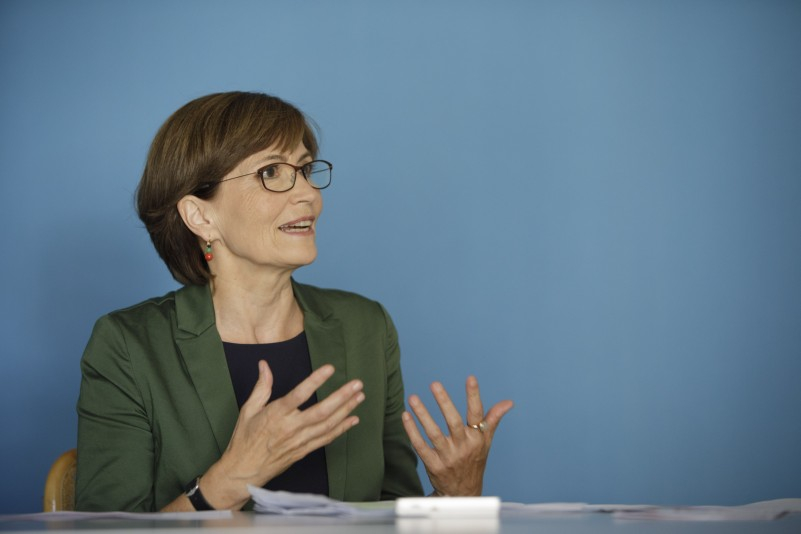
Regula Rytz can look back on a long political career. It began in the cantonal legislature, led her to the executive of the city of Berne and finally to the Federal Parliament as National Councillor and President of the Swiss Green Party. The former elementary school teacher and committed historian is now self-employed and active in various foundation councils and boards.
© Daniel Rihs / Alliance Sud
Interview by Kristina Lanz, Andreas Missbach and Marco Fähndrich
Until the spring you were still in the National Council, since June you have been the new President of Helvetas. What do you find most stimulating about your new job?
Regula Rytz: The world is reeling from crises. I am deeply concerned about the social impacts, both here in Switzerland and, most importantly, in places where people have long had to struggle to survive or to keep a roof over their head. Helvetas brings concrete improvements. To me that is more crucial than ever.
Will you miss anything about day-to-day politics in the Federal Palace?
The work in the committees, as that is where you work with colleagues from other parties to find solutions. I will not miss the increasing polarisation, however. I am happy to be engaged in an area that involves cooperative work.
Are there countries in the Global South with which you have a personal connection?
As a child my husband had lived with his parents in Nepal, where they worked for the organisation that was the predecessor to the Swiss Agency for Development and Cooperation (SDC). Helvetas too was already there at the time. Personally, I have been able to visit Nepal three times and have seen the way development cooperation has evolved over the years. Previously, investment went mostly into infrastructure projects such as road building; today, much more is also being done to stimulate the local economy, through vocational training, for example.
Will Helvetas be more politically engaged in Switzerland in the future?
That task falls to Alliance Sud, and it is doing a marvellous job. Our priority remains working on the ground: we collaborate with SDC and local authorities, and also with local NGOs and the private sector. Besides, building popular awareness in Switzerland regarding global interconnections and calling for greater political coherence has always been a matter of course for us.
You are also on the Board of Trustees of the "Gobat pour la Paix" Foundation. What can we still learn today, in a time of war, from Albert Gobat, a forgotten Nobel Peace Prize laureate and former Government Councillor of the canton of Berne?
Before the First World War, Albert Gobat was instrumental in setting up the Inter-Parliamentary Union in order to bring together people from all countries and parties to prevent further escalation. This shows us that there are always people seeking a way to resolve conflicts peacefully and constructively. We need this today more than ever. And by the way, Gobat came from the Liberal party and can also be an example to today's FDP.The Liberals.
Do you mean to today's Foreign Minister and Federal President Ignazio Cassis? Listening to him, one gets the feeling that Switzerland is world-class…
That depends on which Switzerland we're talking about. I find the level of solidarity of the Swiss people remarkable when it comes to donations or families hosting Ukrainians displaced by the war. Politicians too have taken action – the Confederation, for instance, has endorsed the sanctions and has so far made more than 100 million francs available for humanitarian aid. Of course we could and must do more, especially in implementing the sanctions. The Lugano conference for the reconstruction of Ukraine was also a positive signal. But Switzerland should now take an active part in the European reconstruction platform.
Foreign Minister Cassis missed the international conference on the hunger crisis held in Berlin in June – is there a risk that, like the hunger or the climate crisis, other crises could be forgotten?
It is true that public attention is focused on the war in Ukraine, because of its global dimension and the fact that it concerns a nuclear power. But the dramatic nature of the hunger and climate crises cannot be overlooked. People here are becoming ever more aware that everything is interrelated. According to an ETH study, this is why the majority of the population favours expanding international cooperation. It brings stability and prospects for the future.
Citizens are showing solidarity, but not the Parliament, which wants to increase military spending substantially. The coming years could therefore witness cutbacks in international cooperation owing to the debt brake. What can civil society do about this?
There are major financial challenges stemming from the overlapping crises. Our task is to show that in this situation, development cooperation should be strengthened rather than weakened. If we fail to do enough against global poverty and hunger, the resulting costs will be enormous. Let us not forget that Switzerland has still not yet reached the 0.7% target.
Federal elections are set for next year. Could global issues play a role in them?
I hope and expect that the parties will address the global risks, as they concern us all. Everything that happens in the world today also has something to do with us. The corona pandemic has made this abundantly clear. Today we live in a highly networked world, where it is imperative to enhance equal opportunities worldwide.
Where do you currently see the greatest challenges to international cooperation?
The burgeoning number of violent conflicts and extreme weather events – we need look no further than Pakistan – is creating great demand for humanitarian aid. It saves lives and fulfils people's immediate and basic needs. At the same time, we can ill afford to neglect long-term development cooperation and peace building. Ultimately, these are the only means by which to create long-term prospects and fair opportunities for all, so that people can lift themselves out of poverty. Helvetas brings all these dimensions together. In refugee camps, for example, we provide not just emergency relief, but also educational opportunities.
Time and again we hear the criticism to the effect that the development cooperation work being done by so-called "white saviours" is perpetuating post-colonial patterns. Does this also apply to Switzerland?
The criticism applies less to Switzerland than to major international organisations. Switzerland's development cooperation work is more locally embedded. Helvetas too has always worked closely with local partners and the local people.
But couldn’t the important work being done with local organisations be better communicated?
Absolutely. But we are already very transparent about the impacts of our work and the key role of the local people in it.
What is your view of cooperation with the private sector? Is it more of an opportunity, or is it a risk?
This has always been one of the priorities of Swiss development cooperation. We too have had good experiences in many countries in terms of promoting small and medium-size enterprises and local value chains. The rules are the all-important factor: if all enterprises respect labour and environmental rights, injustices will also diminish. International corporations, in particular, have enormous leverage in this regard.
And what is the role of the political class in this?
For the Swiss public, it goes without saying that Swiss companies abroad should observe environmental standards and human rights. The discussion surrounding the responsible business initiative has borne this out. If the Federal Council takes its promises seriously, then Switzerland must now follow through in the realm of oversight and accountability.
The 2030 Agenda and its sustainable development goals have so far had little impact. Not much is known about them in Switzerland, and companies are exploiting them ever more frequently for "green washing". Should we perhaps concentrate more on implementing individual goals?
Broadly speaking, people feel more drawn to concrete issues. This is why it undoubtedly makes sense to highlight the individual goals. If the climate crisis, for example, is preventing other countries from producing enough food, that is also a problem for us here in Switzerland. The solution lies in dovetailing global and domestic food policy.
And how can Switzerland be persuaded to assume more responsibility in climate foreign policy?
We have to draw attention to the size of our footprint and the degree of influence exerted by the Swiss financial and commodity trading hub. Regrettably, many negative impacts can no longer be averted. Switzerland bears some responsibility here: the country must better assist the poorest countries with implementing resilience and adaptation measures. That will not be possible without additional sources of funding.
Are today's crises an opportunity for our work?
Paradoxically, yes. Raising the profile of the problems can lead to greater readiness to act. If supply chains are suddenly paralysed, if there are food shortages and energy bottlenecks, then there is only one way out – more cooperation, justice and fair opportunities. What is needed now is for us to highlight and elucidate the potential benefits of development cooperation.
But most people in Switzerland are more concerned about their own pension arrangements or rising health costs than about the situation in East Africa, for example…
Our quality of life is also dependent on how people are faring in the poorest countries. A world in which there are many losers is not a pleasant one. A world in which many people have nothing left to lose is a dangerous one. As a historian, I know that times of crisis are often marked by outbreaks of violence. This makes international solidarity all the more crucial. It is the prerequisite for peace and stability.
And what is your message for young people who have lost all hope?
I am a child of the cold war. When I was 20 years old, I spent every day anticipating the possibility of a nuclear war; that motivated me to get involved in politics. I know from experience that tenacious engagement pays off and that there are many positive developments and solutions.
Share post now

global
The Alliance Sud magazine analyses and comments on Switzerland's foreign and development policies. "global" is published four times a year (in german and french) and can be subscribed to free of charge.
